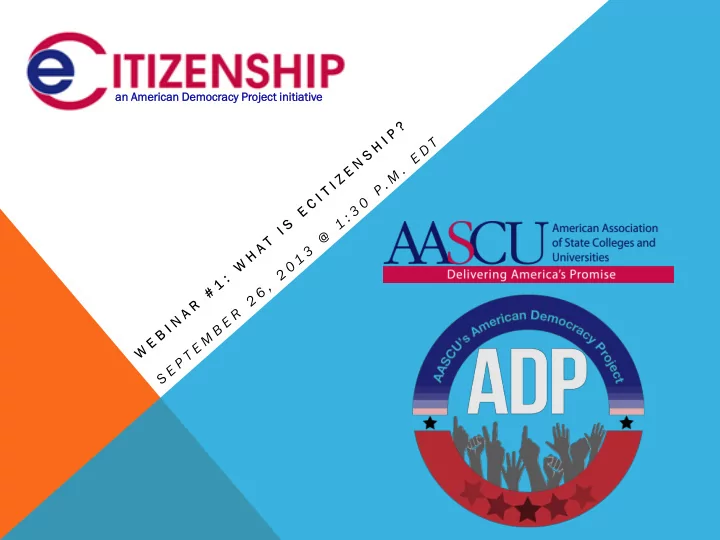

an Americ rican an Democ ocrac racy Project ect initi tiat ativ ive
• Introducti oduction on: : Marc Kruman • Back ckgr groun ound d and In Act ction on: : Renee Bricker • Wha hat the he Res esea earch ch Tel ells s Us: Mike Stout WHAT IS ECITIZENSHIP? AGENDA
Marc W. Kruma uman Wayne State University m.kruman kruman@w @wayne ne.ed .edu Michael el D. D. Stou out Missouri State University Mstout@Missou out@MissouriStat riState.edu e.edu Renee nee Brick cker er University of North Georgia Renee.Brick ee.Bricker@u er@ung ng.e .edu du THE ECITIZENSHIP TEAM
eCitizenship Background & IN ACTION
Students, mission, and web tools ON CAMPUS, IN ACTION
ECITIZENSHIP: WHAT DOES THE RESEARCH TELL US?
Social Networking and Social Media • 72% of American internet users over the age of 18 use at least one social media site – 85% of Americans over the age of 18 use the internet. (Brenner and Smith, 2013)
Demographics of Social Media Users • 89% of internet users between the ages of 18 and 29 reported using social media • Hispanics (80%) more likely to use social media sites than blacks (75%) or whites (70%) • Not substantial differences in social media usage across levels of education or income (Brenner and Smith, 2013)
Types of Social Media Used • 69% use Facebook (Rainey and Duggan, 2013) • 20% use LinkedIn (Duggan & Brenner, 2012) • 18% use Twitter (Brenner and Smith, 2013)
Social Media Has Had an Impact on the Internet and American Life • Facebook revives “dormant” relationships • average social media user has more close ties and is half as likely to be socially isolated than the average American • Facebook users are more trusting than others, and they have more close relationships than other Americans • Regular social media users get more support from their social ties, with Facebook users receiving the most support (Hampton et al, 2009; Hampton et al, 2011 )
Social Media and Online Civic Participation • During the 2008 election, 19% of internet users posted content about political or social issues using social media (Smith et al 2009) • 37% of internet users aged 18-29 used blogs or social networking sites as a venue for political or civic involvement, compared to 17% of online 30-49 year olds, 12% of 50- 64 year olds and 10% of internet users over 65
Social Media and Traditional Civic Participation • social media users who are politically and civically active online are even more active in traditional forms of civic participation than those who do not use the internet at all (Smith et al 2009) • 51% of those involved with a community or political group used digital tools such as e-mail and social media to communicate with the other members of the group (Smith et al 2009)
Social Media and the 2012 Election • 39% of all American adults took part in some sort of political activity on a social networking site during the 2012 presidential campaign (Smith 2013) • social media users say their activity on the sites has prompted them to learn more about social or political issues and to take action around those issues (Smith, 2013)
Social Media and Access to Information • Americans are increasingly turning to the internet for access to news and information. • There are generational differences in where Americans go to access news and information. • People who access news and information online are likely to share information that is important to them through social media, thus raising awareness of the issue, and increasing opportunities to get actively involved.
Why Should We Care? • Younger Americans are increasingly turning to the internet for their news and information about issues they care about • They are using social media for expressing their views on public issues and for opportunities to participate in traditional civic engagement • It’s important for them to be able to critically evaluate the information they are accessing • It’s also important that we understand the potential impact this is having on the public sphere now and in the future (meet the students where they’re at)
Webinar #2: Where here do Stude udents nts get et thei eir r News ws and Why y Does s it Matter er? ? 10/2 /24/20 4/2013 Webinar #3: Shared red Values ues and d Colle lectiv ctive e Impact mpact 12/5/20 5/2013 Webinar #4: Projec ject t Manageme gement nt for Stude udent nt Lea eade dersh ship ip 1/23/20 3/2014 Webinar #5: Sus ustai ainin ning Studen udent t Leader adersh ship p on Civic c En Engagem gement nt Project jects 2/20/20 0/2014 SAVE THE DATES
Recommend
More recommend